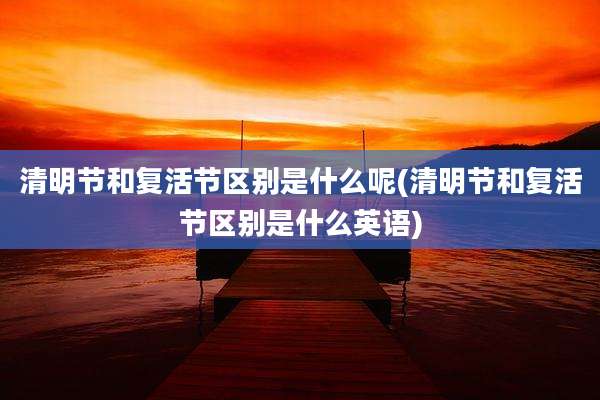清明节和复活节是两个不同文化和宗教的节日,以下是它们的主要区别:

**清明节(Tomb-Sweeping Day or Qingming Festival)区别:**
1. **文化背景:** 清明节起源于中国,是传统的汉族节日,主要纪念祖先和逝去的亲人。
2. **日期:** 清明节通常在阳历的4月4日至6日之间,根据二十四节气中的清明而定。
3. **活动:** 主要活动包括扫墓、祭祖、踏青、放风筝等,人们在这一天会回到家乡,清理祖先的坟墓,献上鲜花、食物和纸钱等祭品。
4. **意义:** 清明节强调对祖先的尊敬和对生命的珍视。
**复活节(Easter)区别:**
1. **文化背景:** 复活节是基督教的重要节日,庆祝耶稣基督的复活。
2. **日期:** 复活节的日期每年都不固定,通常在3月22日至4月25日之间,取决于犹太教逾越节的日期。
3. **活动:** 主要活动包括教堂礼拜、彩蛋寻找、复活节兔等,象征着新的生命和希望。
4. **意义:** 复活节强调信仰、救赎和生命的胜利。
**总结区别(英文):**
- **Cultural Background:** Qingming Festival is a traditional Chinese holiday, while Easter is a Christian festival.
- **Date:** Qingming Festival falls on a fixed date based on the solar calendar, usually April 4th to 6th, while Easter is determined by the Jewish Passover and varies each year.
- **Activities:** Qingming Festival involves tomb-sweeping, honoring ancestors, and outdoor activities like flying kites, while Easter includes church services, egg hunts, and the Easter Bunny, symbolizing new life and hope.
- **Meaning:** Qingming Festival emphasizes respect for ancestors and the appreciation of life, while Easter focuses on faith, redemption, and the triumph of life.
「点击下面查看原网页 领取您的八字精批报告☟☟☟☟☟☟」
